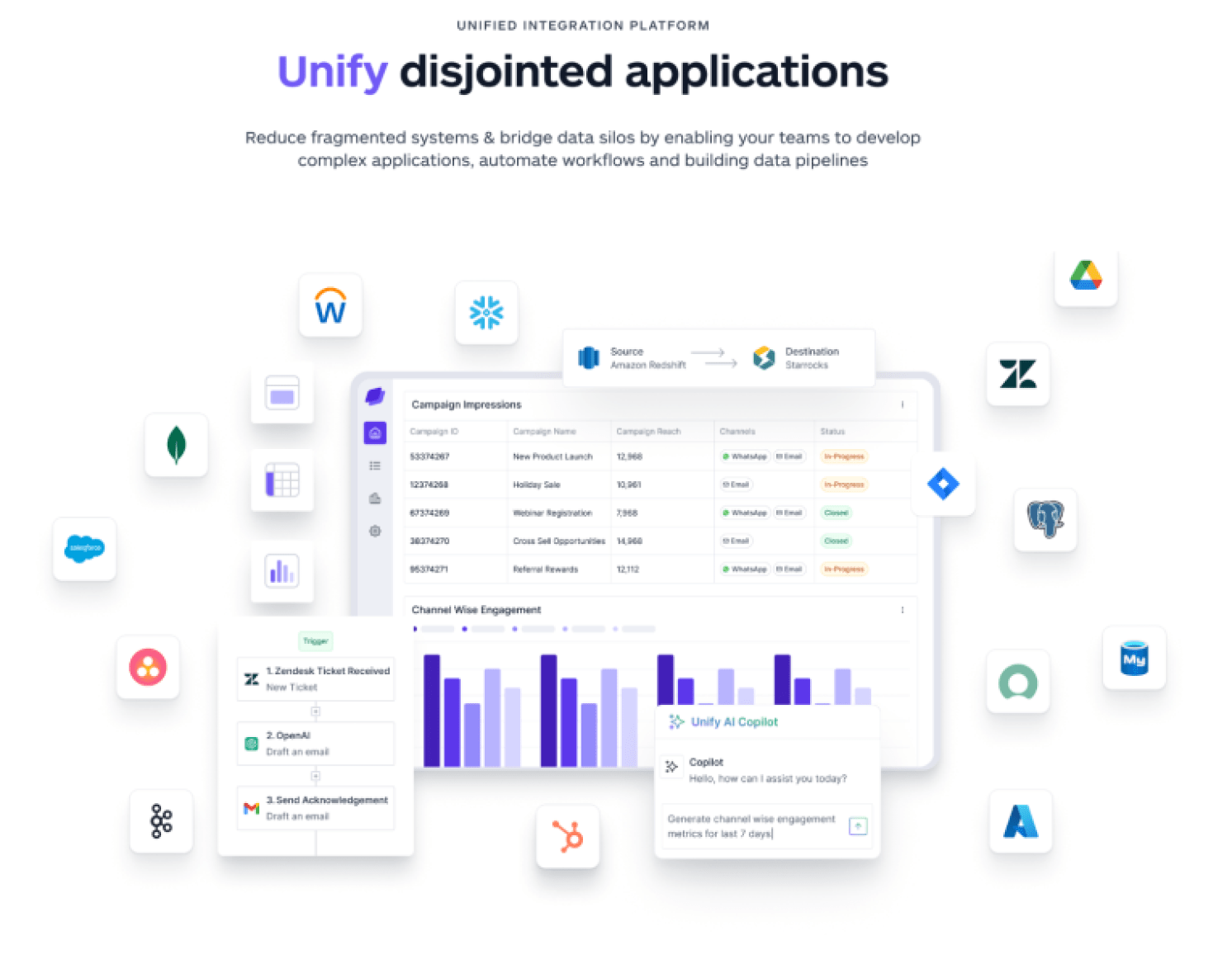Join us in returning to NYC on June 5th to collaborate with executive leaders in exploring comprehensive methods for auditing AI models regarding bias, performance, and ethical compliance across diverse organizations. Find out how you can attend here.
The rise of software-as-a-service (SaaS) ecosystem has transformed how enterprises operate. No matter the problem, there’s always an app to deal with it. But, when these apps grow to the scale of hundreds across the enterprise stack, it can become difficult to make the most of them. Today, UnifyApps, a startup solving this problem by making apps talk to each other, raised $11 million in seed funding, led by Elevation Capital.
Founded by former Sprinkler CTO Pavitar Singh, UnifyApps offers an easy-to-use, AI-powered platform to automate application integration. The tool currently unifies more than 1000 apps and can achieve the integration in a matter of days. In some cases, it can even do the job in minutes, the company says.
“We are not just building a platform; we are creating a movement,” said Singh. “Our vision is to empower enterprises worldwide to break free from the limitations of disjointed applications and unlock the full potential of their technology investments. By unifying applications, we can help businesses create more meaningful connections with their customers, foster more productive and engaged employees, and drive transformative growth and success.”
What makes UnifyApps different?
Traditionally, enterprises have driven their integration efforts with ELT, reverse ELT, IPaaS and low-code application builders. The approaches do the job but have also proven to be complex, time-consuming, and prohibitive – where they focus only on one particular problem.
UnifyApps addresses this gap with a comprehensive approach that targets four vectors critical to successful integration: no-code application development, data integration, workflow automation and the creation of generative AI agents.
At the core, the company’s unified integration platform comes with 1000+ pre-built integrations for top applications, including Gmail, Hubspot and Salesforce. Once users connect to the apps of their choice, they can leverage the company’s no-code builder, dubbed Unify Applications, to bring them together into a single custom application. This enables them to gain a holistic view of different business apps and take action across them from one place. Imagine a single place where you could track all open Jira tickets and send out replies via Gmail to address them.
UnifyApps claims it can help users achieve app integrations that used to take quarters in a matter of days. It even offers more than 30 prebuilt solutions that jumpstart the integration effort, allowing users to connect apps for specific use cases within five minutes.

When the apps are integrated, users can also use the UnifyData and UnifyWorkflows offerings from the company to move data across applications, data warehouses or data lakes (with transformations and automated schema mapping) and automate actions across apps using complex logic like conditions, branching and looping. For instance, a deal status change in Salesforce could prompt a subscription via Stripe or a follow-up via Gmail among other actions.
Notably, as this happens, the integrations power large language model (LLM) agents that use knowledge from across the technology stack to help with different tasks in the unified apps and workflows.
“We allow users to create gen AI-powered copilots integrated with their technology stack. These agents are fine-tuned and purpose-built for custom use cases enabling users to fetch data, take decisions and execute tasks at scale,” Singh told VentureBeat. This way, as a user builds a unified app, they can trigger the copilot to fetch the latest insights from different apps and use those insights to build dashboards.
Rapid growth in early stage
At this stage, UnifyApps is working with over a dozen enterprises that are using the integrations and providing feedback to help the company further refine its offering. Singh denied sharing the names of these companies but confirmed these are large brands in financial services, D2C consumer space, tech-based logistics, telecom and global SaaS product domain.
He added the company expects to provide these customers with a 25% increase in cost efficiency through automation, 4x faster application development, and a 33% improvement in operational efficiency.
As the next step, UnifyApps plans to increase the total number of pre-built integrations to over 5000, giving users more applications to connect and hit $1 million ARR by the end of this year. It also aims to invest more in leveraging generative AI in the whole integration process.
“We are committed to pushing the boundaries of what is possible with gen AI in the context of integration and enterprise use cases. By doubling down on our investment in this transformative technology, we envision a future where AI-powered integration becomes the norm, enabling enterprises to achieve unprecedented levels of efficiency, agility, and innovation,” Singh said.

